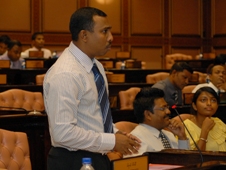A bill to amend the financial regulations to require parliamentary approval before the government obtains foreign loans was debated at parliament yesterday.
Presenting the legislation, Maafanu West MP Abdullah Abdul Raheem of the opposition Dhivehi Rayyithunge Party (DRP), said he was proposing the amendments to “modernise” the financial regulations.
“My purposes [for proposing the bill] include securing economic independence for Maldivians,” he said.
He added amendments were needed for the financial regulations passed in 2006 as it gave powers to the government that contravened the spirit of the constitution.
The regulations needed to be changed in accordance with article 250 of the constitution, he said, which states “Any transfer, sale, lease, release, mortgage (to any person) or destruction of, any property or assets owned by the state, and any such other agreement, shall only be entered into in accordance with law.”
Abdullah said it was an “injustice” to obtain loans under a regulation first made in 1976, adding it was not his intention to restrict powers of the president.
The mid-term budget for 2010 currently being reviewed by a parliamentary committee includes Rf384 million (US$29 million) in foreign loan assistance proposed to plug a Rf4.6 billion (US$357 million) deficit.
The bill proposes amending the regulations to require the president to submit plans to secure loans either for the government or state-owned enterprises for parliamentary approval.
Moreover, the sale or lease of government property and providing subsidies or assistance must be conducted in accordance with a law to be passed by parliament.
During the ensuing debate, MPs disagreed with the extent of parliamentary oversight and powers over the government, with some arguing such laws encroached on the authority of the executive.
Feydhoo MP Alhan Fahmy said there was a contradiction between the proposed amendments and what the MP said was its purpose.
The constitution gave the president powers to formulate and implement monetary and fiscal policies.
“We have to set aside having the People’s Majlis decide everything in our thinking,” he said, adding MPs should not interfere with setting policy and implementation as it was contrary to the presidential system of governance.
Alhan said the president did not have to secure parliamentary approval to obtain loans to plug the budget deficit and MPs were not financial experts.
Moreover, he said, the article in the constitution did not deal with loans and foreign assistance.
Maamigili MP Gasim Ibrahim, sole representative of the Republican Party and former finance minister, said the amendment was urgently needed for the future of the nation.
Article 97 of the constitution clearly states that the executive shall not obtain or receive any money or property by loan or otherwise except pursuant to a law enacted by the People’s Majlis, Gasim said.
Referring to the sale of the majority stake in the state telecommunication company, Dhiraagu, Gasim criticised the government’s policy of privatising state-owned enterprises without consultation with the people’s representatives.
He urged MPs to approve the amendments to ensure that future generations do not inherit a “hollow shell” of an indebted nation.
Hithadhoo North MP Mohamed Aslam of the ruling Maldivian Democratic Party said the amendments would impede the functioning of the government.
Submitting loans required by government companies to parliament every time funds were needed would create difficulties and slow down the proceedings of parliament, he said.
Vili-Maafanu MP Ahmed Nihan of the DRP said the amendments were required to ensure that the government does not exploit loopholes in the regulations in obtaining loans that would indebt the people.

